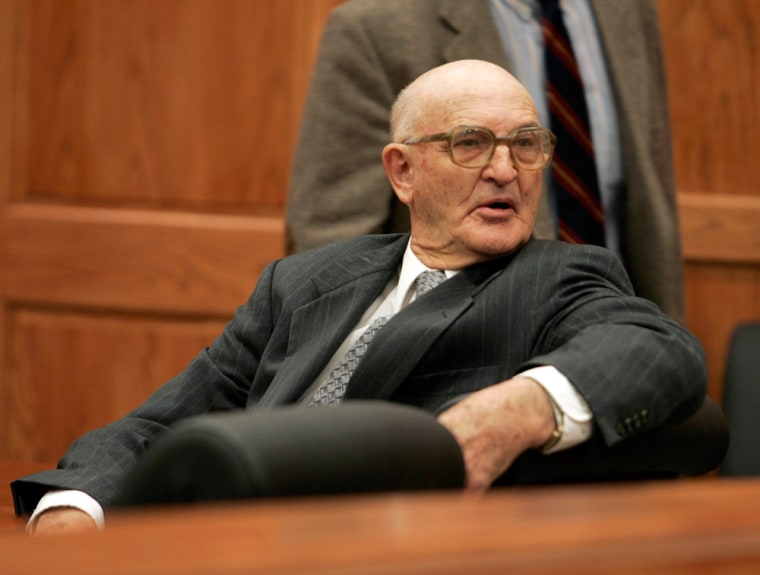Reputed Ku Klux Klansman Edgar Ray Killen watched from a wheelchair Monday as jury selection began in his murder trial in one of most shocking crimes of the civil rights era — the 1964 slayings of three voter-registration volunteers.
The case against the 80-year-old Killen represents Mississippi’s latest attempt to deal with unfinished business from the state’s bloodstained racist past.
In a measure of how much things have changed over the past 41 years, about a third of the jury pool was black, roughly reflecting the racial makeup of the county’s 28,700 residents. In 1964, very few blacks were registered to vote in Neshoba County, and juries were usually all-white.
The slayings of James Chaney, Andrew Goodman and Michael Schwerner — three young men who were helping register blacks during the “Freedom Summer” of 1964 — galvanized the civil rights movement and helped win passage of the Civil Rights Act of 1964. The case was dramatized in the 1988 movie “Mississippi Burning.”
Tight security
Security was tight as about 110 potential jurors were brought to the county courthouse on buses and ushered in through a side door. Another group is expected on Tuesday. Summonses went out to about 400 people.
Killen, a part-time preacher who has been free on bail, looked straight ahead and said nothing as he was taken into the two-story, red-brick courthouse. Killen is in a wheelchair because of arthritis that was aggravated after his legs were broken in a tree-cutting accident in March. He sat silently inside the courtroom.
Circuit Judge Marcus Gordon asked potential jurors about such things as their health, their reading ability and any hardships they might face if they were picked for the case. By late morning, about three dozen people had been excused.
Streets near the courthouse in this town of about 7,300 were barricaded more than an hour before jury selection started, and those entering the building had to pass through metal detectors. Inside the courtroom, as many as nine uniformed officers, including state troopers and sheriff’s deputies, stood guard.
Conflicting reactions
“This is something that happened a long time ago, but it was something that had to come back again to get the truth out of it,” said Glenda Morgan, 52, a black woman who lives across the street from Mount Nebo Missionary Baptist Church, the gathering spot for civil rights workers in 1964.
Killen “is an old man, but sometimes God will let you live long enough to be punished while your eyes are still open,” she said.
Others said Killen’s trial was a waste of time and money.
“If they were going to do it, they ought to have done it a long time ago,” said D.V. McNair, 89, a white man who said Killen would probably be convicted and the burden of caring for him placed on the state. “It’s just going to cost the taxpayers.”
There were no early demonstrations, but a man on hand for Killen’s arrival passed out business cards identifying himself as J.J. Harper of Cordele, Ga., Imperial Wizard of the American White Knights of the Ku Klux Klan Inc. The man would not talk with reporters.
Killings that shocked the nation
The 1964 murders of James Chaney, Andrew Goodman and Michael Schwerner shocked the nation and brought attention to the struggle to register black voters in the segregated South. Their killings were depicted in the 1988 movie “Mississippi Burning.”
Among those at the courthouse was Chaney’s brother, Ben Chaney of New York, who has been the most vocal member of the family on seeking justice in the case.
Killen was one of those tried in 1967 on federal charges of violating the victims’ civil rights. Killen’s case ended in a hung jury, but seven others were convicted. None served more than six years.
Once the jury is seated, opening arguments could start by Wednesday or Thursday, attorneys say. The trial itself could last two weeks.
Jury selection a tough task
Defense attorney James McIntyre said before entering the courthouse that it would be extremely difficult to seat a jury.
“Everybody in the world has known about this case through the news media, books and hearsay,” he said. “There’s no place on earth you can go where people haven’t heard about this case.”
But eventually, he said, “I think the jury will acquit him.”
Circuit Court Judge Marcus Gordon last week denied a defense motion to delay the trial to give Killen more time to recover from osteoarthritis that was aggravated when both of his legs were broken in a tree-cutting accident in March.
Chaney, a black man from Mississippi, and Schwerner and Goodman, white men from New York, were together in a car near Philadelphia on June 21, 1964, when they were stopped by Klansmen, beaten and shot to death. Their bodies were found 44 days later, buried in an earthen dam.
Journalists from as far away as Sweden applied for credentials to cover the trial, which will be televised by Court TV.
Gordon was offered extra security, but he said: “I’m not sure I want that. I’ve always been a two-fisted kind of guy.”
